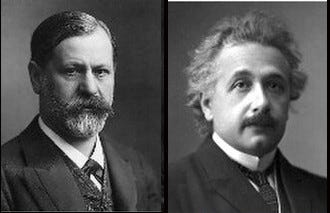Welcome, welcome, welcome - a thousand times welcome - to everyone who has joined our thriving Crime & Psychology community in the last month or so. It’s good to have you here. I’m sure you won’t regret hitting that Subscribe button (and, in the unlikely event that you do, let me remind you not to unsubscribe before signing up a couple of enemies).
You’ve heard the ancient saying: ‘The best time to join Crime & Psychology was eighteen months ago, but the second-best time is now’. And this is indeed an excellent time. Many exciting articles are in store! You can look forward to reading about the state of offender profiling (honestly, the state of it…), the serial killer and grave-robber Ed Gein, criminal stereotypes, bystander intervention…all this and more,
This week’s article takes careful aim at our world-famous Crime & Psychology logo, breathes deeply, squeezes the trigger, and misses almost completely. Well, it misses the Crime bit. We do hit the word Psychology bang in the middle, however. Wednesday’s short piece bravely attempts the impossible and, in traditional Crime & Psychology style, succeeds effortlessly.
Like many adventurous young souls, you may be contemplating a journey this autumn to your local university to begin your studies in Psychology. It struck me that you might be glad of a short guide to some of those abstruse-but-fundamental concepts you doubtless heard all about that time your cousin came back on her Christmas vacation and told you, in awed yet reverential tones, ‘Psychology is hard’. And if you’re not contemplating any such journey, but are just interested in the subject, well, even better.
No two ways about it, Psychology is hard. You know what Albert Einstein famously said?: ‘How dificult Psychology is! Much more difficult than Physics’.
Or perhaps he didn’t. I read the quote, somewhere, years ago, but I’ve never been able to find it again. Einstein is like Oscar Wilde or Winston Churchill: he gets just as much credit for the things he didn’t say as for those he did. Even so, from time to time I like to reel out the quote for my undergraduates. They find it comforting to know that the world’s most famous amateur violinist had the same anxieties they are currently struggling with.
MORE FROM CRIME & PSYCHOLOGY:
CESARE LOMBROSO AND ‘CRIMINAL MAN’
The poet, Alexander Pope, famously observed that the ‘proper study of mankind is man’, which is encouraging until you remember that Pope never had to choose an appropriate post-hoc test after running a 3x2 Analysis of Variance.
‘A 3x2 Analysis of Variance? What’s Jason going on about?’ So you may well be thinking. That’s precisely why I wrote the article. Full disclosure – I shan’t be writing about Analysis of Variance particularly, since you won’t need that for a year or so anyway – but there will be other concepts, much more interesting and with no numbers in them. Think of it as the guidebook earlier generations of Psychology students wished they had! I know I did.
I’ll see you on Wednesday, Crime & Psychology fan! Until then, amuse yourself, please, by banging a blue button or even buying me a coffee.
Einstein and Freud pictures courtesy of WikiMedia Commons






"Know then thyself..." (One of my mother's favourite quotes.)